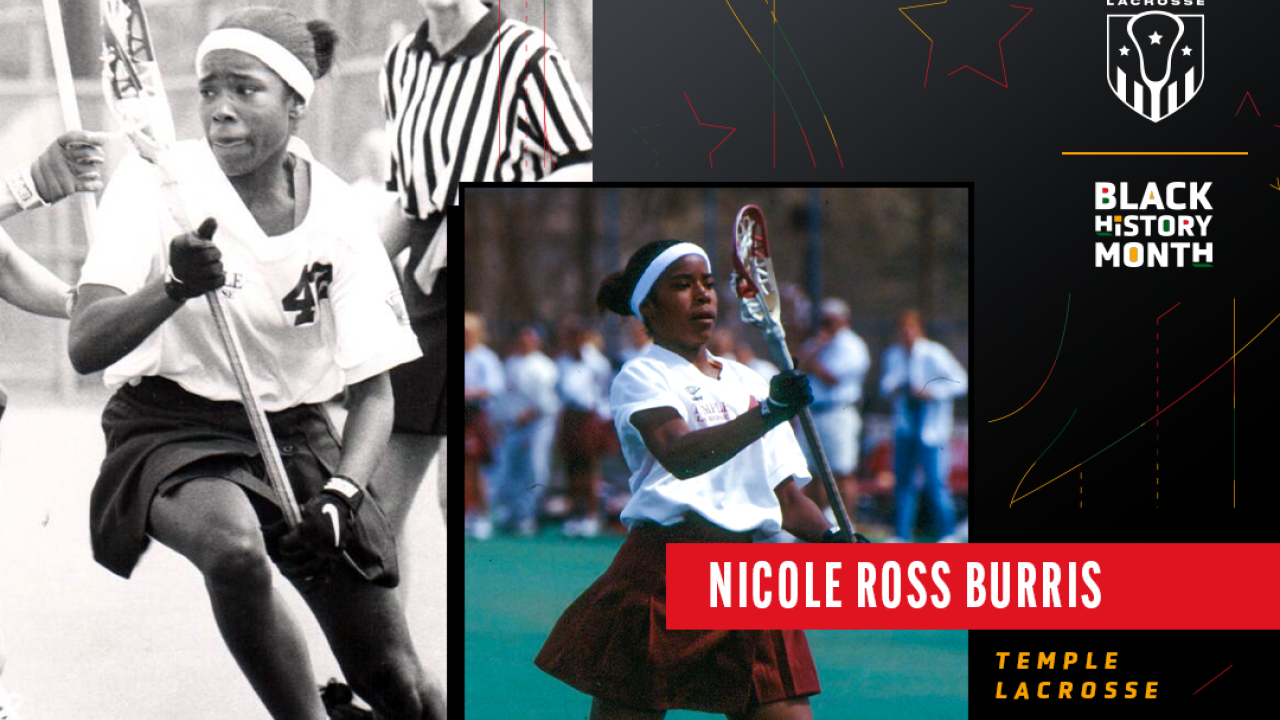
Temple Great Nicole Ross Burris Rekindling Connection to Lacrosse
Tina Sloan Green is one of the most influential figures in the history of women’s lacrosse. First Black player on a U.S. national team. Three national championships as the head coach at Temple. Induction into the National Lacrosse Hall of Fame.
Given that legacy, it shouldn’t have been a surprise that a promising Black high school lacrosse player wound up at Temple just a few years after Sloan Green’s coaching career ended. But Nicole Ross Burris’ path to Philadelphia came about completely on her own, although Sloan Green ended up having a major influence on her experience.
Ross Burris was introduced to the sport in her hometown of Crofton, Md., the way so many young players begin playing – a friend asked her to play. In this case, her friend was also trying the sport for the first time.
“She didn’t want to be alone as the new girl,” Ross Burris said. “We made the team, but I think I fell in love with it. I was always a tomboy and I loved to run, so I really liked the idea of the sport itself even though I didn't know anybody who played in my close circle.”
Ross Burris kept playing the sport through high school, but thought she was actually a better soccer player. The Naval Academy had expressed interest in her as a college soccer player, but fate would intervene. Priscilla Diacont, the junior varsity coach at Arundel High School, went to a coaching clinic at Temple and told then Owls’ head coach Kim Ciarrocca about Ross Burris. Ciarrocca asked to see some tape.
So, in the days of old school VHS tapes, Diacont helped Ross Burris put together a highlight video and sent it off to Ciarrocca. The coach was intrigued and came to watch her play, ultimately offering Ross Burris a chance to join the Owls.
“It was just like this is where I'm supposed to go,” Ross Burris said. “I tell my kids now, I have a junior in high school who also wants to pursue sports in college, and I said, ‘You know you can have your dream school, but sometimes it's really great to go to a place that wants you because they're invested.’ I was grateful that Temple wanted me.”
Forging her own path wasn’t a new phenomenon.
“It was a bit of a struggle being one of the only African-Americans,” Ross Burris said of her early lacrosse career. “For me, it was just me. My best friend when I was in seventh and eighth grade played with us, but then she quit in ninth grade. Then it was just myself. I don’t want to say you’re trying to belong, but you are. You’re trying to fit in.”
She found a way to fit in when she arrived at Temple, a transition eased by Sloan Green. Professor Sloan Green that is. As a freshman, Ross Burris took Sloan Green’s course on racism in college sports.
“It was the first time I had been in any kind of environment, but definitely in a classroom environment, where the conversation was so open and there were people in it who knew exactly how I felt and had gone through similar experiences,” Ross Burris said. “It let you know you're not alone, you know, there is a place for you. Yes, [racism] does exist, but it doesn't have to stop you, it doesn't have to slow you down. It can fuel you to be as great as you could possibly be.”
* * *
She came to a Temple program used to winning, something she hadn’t experienced as much as she would have liked in her sports’ experiences. Proving she belonged to players she looked up to drove her.
“I was just trying to show these upperclassmen that I deserve to be on the team,” Ross Burris said, “but I also deserve to be on the field.”
She earned a starting spot by her sophomore year and helped Temple reach the NCAA semifinals in both 1997 and 1998. The 1997 season ended with a 9-6 loss to Maryland, which was in the midst of a run of seven straight national championships. The loss is still fresh in her mind, more than 25 years later.
“Even though it's been a while, I can still remember it like it was yesterday,” Ross Burris said. “I remember every aspect of it. I've never been on a team that was just so dialed in and so focused in that moment, when you're all in that headspace from the coaches all the way down to the last man on the bench. We knew we were going to win because we deserved it. We worked so hard.”
It didn’t happen, nor did it happen the next year when Temple fell to North Carolina 11-10 in the semifinals.
Ross Burris shifted to a new role in a new environment for her senior year in 1999. Temple moved into a conference, the Atlantic 10, for the first time in program history and with heavy graduation losses, Ross Burris took on a bigger leadership role.
She responded with one of the best seasons in Temple history, scoring 67 goals, nearly half of the team’s total of 142 for the season, and earned second team All-America honors. She displayed her all-around play with 53 groundballs, but the season came to a bitter end, an 8-7 loss to Virginia Tech in the A-10 championship game. Ross Burris scored five of Temple’s goals and thought they were in position to win the championship with a one-goal lead late.
Virginia Tech scored the final two goals for the win with an ironic twist. Scoring the last two goals for the Hokies was Karen Diacont, the daughter of the Arundel JV coach that had played such an instrumental role in Ross Burris ending up at Temple. Even with the loss, Ross Burris was named the tournament MVP.
“You know how coaches say leave it all on the field – I honestly feel my senior year I did that,” Ross Burris said. “I gave every single piece of me to the game by the time we were done.”
* * *
A new life beckoned. Her boyfriend at Temple, and eventual husband, Henry Burris, began his professional football career in the Canadian Football League in 1998. It was one of the most memorable careers in CFL history. He won three Grey Cups and threw for 63,369 yards and 373 touchdowns and ran for another 68 touchdowns before being inducted into the CFL Hall of Fame.
They spent roughly two decades in Canada and their sons, Armand and Barron, were both born there.
She played in the Vail Shootout a couple of times and considered an opportunity to coach boys’ lacrosse in Canada, but the timing didn’t work out. She largely left her lacrosse career behind.
“I joke with my husband that it's like we graduated from Temple, I moved home for a year and then I was in Canada, so it's like that part of my life kind of got left in stone.” Ross Burris said. “It's just kind of on hold and now I'm going to this other country that has no idea who I am. Sometimes I look back and I’m like did I really do that, because right now I don't feel like that's me.”
The family relocated to the Chicago area about a year and a half ago when Henry took a coaching job in the NFL. Coming back to the states has come on the heels of some big honors for Ross Burris, helping to rekindle her connection to the sport.
Lacrosse alum Nicole Ross Burris was honored at the @tumbbhoops game Sunday.
— Temple Lacrosse (@Templelacrosse) March 1, 2022
Burris attended Temple from 1995-1999. She was named an All-American in 1999 and was inducted into the Temple athletics Hall of Fame as a member of the class of 2020 pic.twitter.com/uhBlbTRsSM
She was named to the Temple Athletics Hall of Fame in 2020 and the following year, she was named to USA Lacrosse’s All-Time Black lacrosse team, alongside Sloan Green and one of her early role models, National Lacrosse Hall of Famer and four-time U.S. team member Cherie Greer. Ross Burris read about Greer in a magazine and said seeing her on the big stage “just made it feel possible.”
She’s appreciative of the recent recognition she herself has received.
“I can't really even put it into words,” Ross Burris said. “It really is just an honor, but I didn't do it for individual accolades. I was just so grateful and thankful to be able to play.”
Now, she’s ready to get back in the game. This spring, she’ll be on the sidelines as a JV coach at Stevenson High School in Lincolnshire, Ill., ready to pass on the lessons she learned from those that helped shape her career.
Brian Logue
Brian Logue has worked at USA Lacrosse since 2000 and is currently the senior director of communications. He saw his first lacrosse game in 1987 - Virginia at Delaware - and fell in love with the sport while working at Washington and Lee University.

Related Articles





